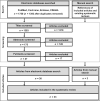Omega-3 Fatty Acid Dietary Supplements Consumed During Pregnancy and Lactation and Child Neurodevelopment: A Systematic Review
- PMID: 34383914
- PMCID: PMC8764572
- DOI: 10.1093/jn/nxab238
Omega-3 Fatty Acid Dietary Supplements Consumed During Pregnancy and Lactation and Child Neurodevelopment: A Systematic Review
Abstract
Background: Maternal nutrition during pregnancy and lactation has profound effects on the development and lifelong health of the child. Long-chain PUFAs are particularly important for myelination and the development of vision during the perinatal period.
Objectives: We conducted a systematic review to examine the relationship between supplementation with omega-3 fatty acids during pregnancy and/or lactation and neurodevelopment in children, to inform the Scientific Report of the 2020 Dietary Guidelines Advisory Committee.
Methods: We identified articles on omega-3 fatty acid supplementation in pregnant and lactating women that included measures of neurodevelopment in their children (0-18 y) by searching PubMed, CENTRAL, Embase, and CINAHL Plus. After dual screening articles for inclusion, we qualitatively synthesized and graded the strength of evidence using pre-established criteria for assessing risk of bias, consistency, directness, precision, and generalizability.
Results: We included 33 articles from 15 randomized controlled trials (RCTs) and 1 prospective cohort study. Of the 8 RCTs that delivered omega-3 fatty acid dietary supplements during pregnancy alone (200-2200 mg/d DHA and 0-1100 mg/d EPA for approximately 20 wk), 5 studies reported ≥1 finding that supplementation improved measures of cognitive development in the infant or child by 6%-11% (P < 0.05), but all 8 studies also reported ≥1 nonsignificant (P > 0.05) result. There was inconsistent or insufficient evidence for other outcomes (language, social-emotional, physical, motor, or visual development; academic performance; risks of attention deficit disorder, attention-deficit/hyperactivity disorder, autism spectrum disorder, anxiety, or depression) and for supplementation during lactation or both pregnancy and lactation. Populations with a lower socioeconomic status and adolescents were underrepresented and studies lacked racial and ethnic diversity.
Conclusions: Limited evidence suggests that omega-3 fatty acid supplementation during pregnancy may result in favorable cognitive development in the child. There was insufficient evidence to evaluate the effects of omega-3 fatty acid supplementation during pregnancy and/or lactation on other developmental outcomes.
Keywords: anxiety; attention deficit disorder; attention-deficit hyperactivity disorder; autism spectrum disorder; cognition; depression; lactation; omega-3 fatty acids; pregnancy; systematic review.
© The Author(s) 2021. Published by Oxford University Press on behalf of the American Society for Nutrition.
Figures
Comment in
-
DHA and Cognitive Development.J Nutr. 2021 Nov 2;151(11):3265-3266. doi: 10.1093/jn/nxab299. J Nutr. 2021. PMID: 34590117 Free PMC article. No abstract available.
Similar articles
-
Omega-3 fatty acids from Supplements Consumed before and during Pregnancy and Lactation and Developmental Milestones, Including Neurocognitive Development, in the Child: A Systematic Review [Internet].Alexandria (VA): USDA Nutrition Evidence Systematic Review; 2020 Jul. Alexandria (VA): USDA Nutrition Evidence Systematic Review; 2020 Jul. PMID: 35289988 Free Books & Documents. Review.
-
Maternal Diet during Pregnancy and Lactation and Risk of Child Food Allergies and Atopic Allergic Diseases: A Systematic Review [Internet].Alexandria (VA): USDA Nutrition Evidence Systematic Review; 2020 Jul. Alexandria (VA): USDA Nutrition Evidence Systematic Review; 2020 Jul. PMID: 35289989 Free Books & Documents. Review.
-
Seafood Consumption during Pregnancy and Lactation and Neurocognitive Development in the Child: A Systematic Review [Internet].Alexandria (VA): USDA Nutrition Evidence Systematic Review; 2020 Jul. Alexandria (VA): USDA Nutrition Evidence Systematic Review; 2020 Jul. PMID: 35436065 Free Books & Documents. Review.
-
Omega-3 Fatty Acids and Maternal and Child Health: An Updated Systematic Review.Evid Rep Technol Assess (Full Rep). 2016 Oct;(224):1-826. doi: 10.23970/AHRQEPCERTA224. Evid Rep Technol Assess (Full Rep). 2016. PMID: 30307735
-
Folic acid supplementation and malaria susceptibility and severity among people taking antifolate antimalarial drugs in endemic areas.Cochrane Database Syst Rev. 2022 Feb 1;2(2022):CD014217. doi: 10.1002/14651858.CD014217. Cochrane Database Syst Rev. 2022. PMID: 36321557 Free PMC article.
Cited by
-
Association between Mediterranean diet and metal mixtures concentrations in pregnant people from the New Hampshire Birth Cohort Study.Sci Total Environ. 2024 Feb 20;912:169127. doi: 10.1016/j.scitotenv.2023.169127. Epub 2023 Dec 7. Sci Total Environ. 2024. PMID: 38070554
-
Infant feeding-a scoping review for Nordic Nutrition Recommendations 2023.Food Nutr Res. 2024 Feb 5;68. doi: 10.29219/fnr.v68.10456. eCollection 2024. Food Nutr Res. 2024. PMID: 38370110 Free PMC article. Review.
-
Maternal plasma fatty acid patterns in mid-pregnancy and offspring epigenetic gestational age at birth.Epigenetics. 2022 Nov;17(11):1562-1572. doi: 10.1080/15592294.2022.2076051. Epub 2022 May 17. Epigenetics. 2022. PMID: 35581922 Free PMC article.
-
Genetic Variants in One-Carbon Metabolism and Their Effects on DHA Biomarkers in Pregnant Women: A Post-Hoc Analysis.Nutrients. 2022 Sep 15;14(18):3801. doi: 10.3390/nu14183801. Nutrients. 2022. PMID: 36145177 Free PMC article. Clinical Trial.
-
Something Smells Fishy: How Lipid Mediators Impact the Maternal-Fetal Interface and Neonatal Development.Biomedicines. 2023 Jan 10;11(1):171. doi: 10.3390/biomedicines11010171. Biomedicines. 2023. PMID: 36672679 Free PMC article. Review.
References
-
- Mochizuki K, Hariya N, Honma K, Goda T. Relationship between epigenetic regulation, dietary habits, and the developmental origins of health and disease theory. Congenit Anom (Kyoto). 2017;57(6):184–90. - PubMed
-
- O'Donnell KJ, Meaney MJ. Fetal origins of mental health: the developmental origins of health and disease hypothesis. Am J Psychiatry. 2017;174(4):319–28. - PubMed
-
- Prado EL, Dewey KG. Nutrition and brain development in early life. Nutr Rev. 2014;72(4):267–84. - PubMed
-
- USDA, US Department of Health Human Services. Dietary guidelines for Americans, 2020. 9th ed. Washington, DC: US Government Printing Office; 2020.



